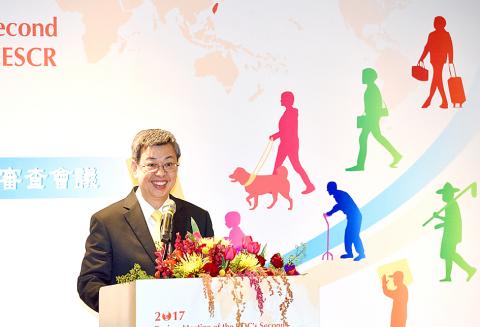The government plans to establish a national human rights institution to meet with the international Paris Principles standards, Vice President Chen Chien-jen (陳建仁) said yesterday.
The institution would promote and protect human rights and aim to prevent major violations, Chen said at the opening ceremony of the meeting for the review of the International Covenant on Civil and Political Rights and the International Covenant on Economic, Social and Cultural Rights report.
On Dec. 10, 2009, Taiwan adopted two international human rights treaties, which were the basis for establishing a human rights reporting system, and in April 2012, presented its first national human rights report.

Photo: Peter Lo, Taipei Times
Taiwan invited independent human rights bodies from the international community to visit Taipei in 2013 to review the report.
The review of Taiwan’s second national report in Taipei began yesterday and concludes on Friday. It is being broadcast live.
“Human rights are no longer an issue limited to closed-door discussions,” said the Ministry of Justice, which is working with the Presidential Office’s Human Rights Consultative Committee, chaired by Chen, to host the review meeting.
Chen said that three of the nine core international human rights treaties have not yet become law, including the Convention against Torture and Other Cruel, Inhuman or Degrading Treatment or Punishment.
The other two are the International Convention on the Protection of the Rights of All Migrant Workers and Members of Their Families, and the International Convention for the Protection of All Persons from Enforced Disappearance, he said.
The government will make every effort to enact the legislation, Chen said.
The Paris Principles are key evaluation criteria for national human rights institutions. They were adopted unanimously in a resolution by the UN Human Rights Commission in 1993 and in the final acts of the Human Rights Conference that same year.

The Ministry of Economic Affairs has fined Taobao NT$1.2 million (US$36,912) for advertisements that exceed its approved business scope, requiring the Chinese e-commerce platform to make corrections in the first half of this year or its license may be revoked. Lawmakers have called for stricter enforcement of Chinese e-commerce platforms and measures to prevent China from laundering its goods through Taiwan in response to US President Donald Trump’s heavy tariffs on China. The Legislative Yuan’s Finance Committee met today to discuss policies to prevent China from dumping goods in Taiwan, inviting government agencies to report. Democratic Progressive Party Legislator Kuo Kuo-wen (郭國文) said

The Ministry of Economic Affairs has fined Taobao NT$1.2 million (US$36,900) for advertisements that exceeded its approved business scope and ordered the Chinese e-commerce platform to make corrections in the first half of this year or its license would be revoked. Lawmakers have called for stricter supervision of Chinese e-commerce platforms and more stringent measures to prevent China from laundering its goods through Taiwan as US President Donald Trump’s administration cracks down on origin laundering. The legislature’s Finance Committee yesterday met to discuss policies to prevent China from dumping goods in Taiwan, inviting government agencies to report on the matter. Democratic Progressive Party

Taiwan and its Pacific ally Tuvalu on Tuesday signed two accords aimed at facilitating bilateral cooperation on labor affairs, according to Taiwan’s Ministry of Foreign Affairs (MOFA). The governments inked two agreements in Taipei, witnessed by Foreign Minister Lin Chia-lung (林佳龍) and visiting Deputy Tuvaluan Prime Minister Panapasi Nelesone, MOFA said in a news release. According to MOFA, the agreements will facilitate cooperation on labor issues and allow the two sides to mutually recognize seafarers’ certificates and related training. Taiwan would also continue to collaborate with Tuvalu across various fields to promote economic prosperity as well as the well-being of their

Sung Chien-liang (宋建樑), who led efforts to recall Democratic Progressive Party (DPP) Legislator Lee Kun-cheng (李坤城), was released on bail of NT$80,000 today amid outcry over his decision to wear a Nazi armband to questioning the night before. Sung arrived at the New Taipei District Prosecutors’ Office for questioning in a recall petition forgery case last night wearing a red armband bearing a swastika, carrying a copy of Adolf Hitler’s Mein Kampf and giving a Nazi salute. Sung left the building at 1:15am without the armband and covering the book with his coat. Lee said today that this is a serious